"Being told about the effects of climate change is an appeal to our reason and to our desire to bring about change. But to see that Africans are the hardest hit by climate change, even though they generate almost no greenhouse gas, is a glaring injustice, which also triggers anger and outrage over those who seek to ignore it." -Sigmar Gabriel
With all of the scientific issues subject to politicization in this world, there's arguably none that raises such strong emotions as the issue of global warming and climate change. This is the final installment of a three-part series on how one could figure out whether global warming was real, and if it was real, if it was caused by human activity. You can read part 1, which talked about the factors that determine the temperatures of the inner planets, and part 2, which talked about the mechanisms by which an atmosphere (and the gases in it) raise the temperature on any world that has one. Including ours.
Today, with that in mind, I'd like to focus on what's been going on in the relatively recent past here on Earth.
This is the Earth's atmosphere, with which we're all familiar. What you might not be as familiar with is what that atmosphere is made out of, in terms of its chemical composition. Yes, you know that it's got Oxygen in it and Carbon Dioxide, but the breakdown is incredibly important. You see, as we learned in part 2, the Earth's temperature is 33 °C (59 °F) warmer than it would be if it didn't have an atmosphere.
So what's that atmosphere made out of?
Mostly Nitrogen, which is about 78% of our dry atmosphere, followed by Oxygen, at about 21%. There's also about 1% argon, an inert gas, followed by small amounts of carbon dioxide, neon (another inert gas), methane, and other trace elements and molecules.
It's important that I say "dry atmosphere" here, because, well, our atmosphere isn't ever really dry. We've got this pesky little thing on our planet that prevents that from ever really happening.
And by "little", of course, I mean our oceans, which contain about 300 times the mass of the entire atmosphere combined. Because of how chemistry (evaporation, vapor pressure, etc.) works, that adds around an additional 1% of our atmosphere, on average, in the form of water vapor. That number is highly variable, but that's one component we really have no control over.
There are others; we don't control the water vapor, the clouds, the oxygen or the ozone. (At least, not yet.) But the amount of carbon dioxide in our atmosphere has changed substantially over the past few centuries, and that is, without a doubt, due to human activity.
Up until the end of the 18th century, Carbon Dioxide levels were pretty stable at about 270-280 parts-per-million (ppm) in our atmosphere, changing by small amounts due to things like volcanic eruptions, forest fires, and other natural activity. But with the advent of the industrial revolution, all that started to change.
For the first time in natural history, hundreds of millions of years worth of carbon -- carbon that had been stored under the surface of the Earth -- the remnants of carbon-based organisms that had been buried underground and turned by time into oil, coal, and other resources, was being burned and returned to the atmosphere, all at once.
You can do the math for yourself, and you'll find that since the dawn of the industrial revolution, we have burned-and-added about 1.5 trillion metric tonnes of Carbon Dioxide to the atmosphere.
This should be a little surprising, because if you do the math about how much Carbon Dioxide is in our atmosphere right now, it's "only" about 2.1 trillion metric tonnes (or about 400 ppm), which is an increase of only around 0.7 trillion tonnes from pre-industrial revolution levels (270 ppm). So where did the other 0.8 trillion tonnes go?
Into the ocean. Any idea what you get when you mix carbon dioxide (CO2) with water (H2O)? You get H2CO3, also known as carbonic acid. (And yes, it was our old buddy Arrhenius who figured that out, too.) If you've ever heard of ocean acidification, this is where it comes from, and this is undoubtedly what's causing it.
But that's not what all this is about; back to the issue at hand: global warming. Based on what we went over in the first two parts, we know that planets absorb light in mostly the ultraviolet, visible, and near infrared, and then radiate that energy back into space in the mid-and-far infrared. At least, they try to, unless something in the atmosphere absorbs some of that infrared energy, and re-radiate it back to the planet's surface. How good are Earth's gases at doing that?
They're only okay, but they're important enough that they've warmed the planet by 33 °C (59 °F) over what it would be without an atmosphere at all. In fact, of that 33 °C (59 °F) that Earth is warmed by due to the atmosphere, atmospheric science has been able to quantify how much is due to the different components:
50% of the 33 K greenhouse effect is due to water vapor, about 25% to clouds, 20% to CO2, and the remaining 5% to the other non-condensable greenhouse gases such as ozone, methane, nitrous oxide, and so forth.
So if 20% is due to Carbon Dioxide, and we've increased the Carbon Dioxide level by 50%, does that mean we're in for another 3.3 °C (5.9 °F) of warming?
Not necessarily. There are other factors that come into play, and when you do something to heat the Earth up, it has many natural mechanisms to attempt to regulate itself.
There's latent heat stored in glaciers and icecaps, and if you start to melt them, that releases cooler water into the oceans, lakes and rivers. For small increases in Carbon Dioxide, plant activity will increase, removing some of that greenhouse gas from the atmosphere.
The danger is in what happens if we add too much Carbon Dioxide to the atmosphere too quickly, which could mean the Earth's temperature would start to rise in response to an increased greenhouse effect.
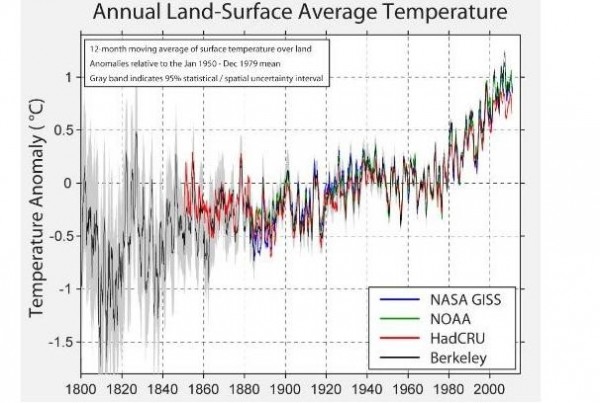 Image credit: Berkeley Earth Surface Temperature project, via http://www.berkeleyearth.org/.
Image credit: Berkeley Earth Surface Temperature project, via http://www.berkeleyearth.org/.
And that's exactly what's happened. We had what appeared to be normal temperature fluctuations -- consistent with what was historically observed -- up until the late 1970s. But after that, coincident with an exponentially rising increase in Carbon Dioxide concentrations, the average temperature of the Earth began rising, too.
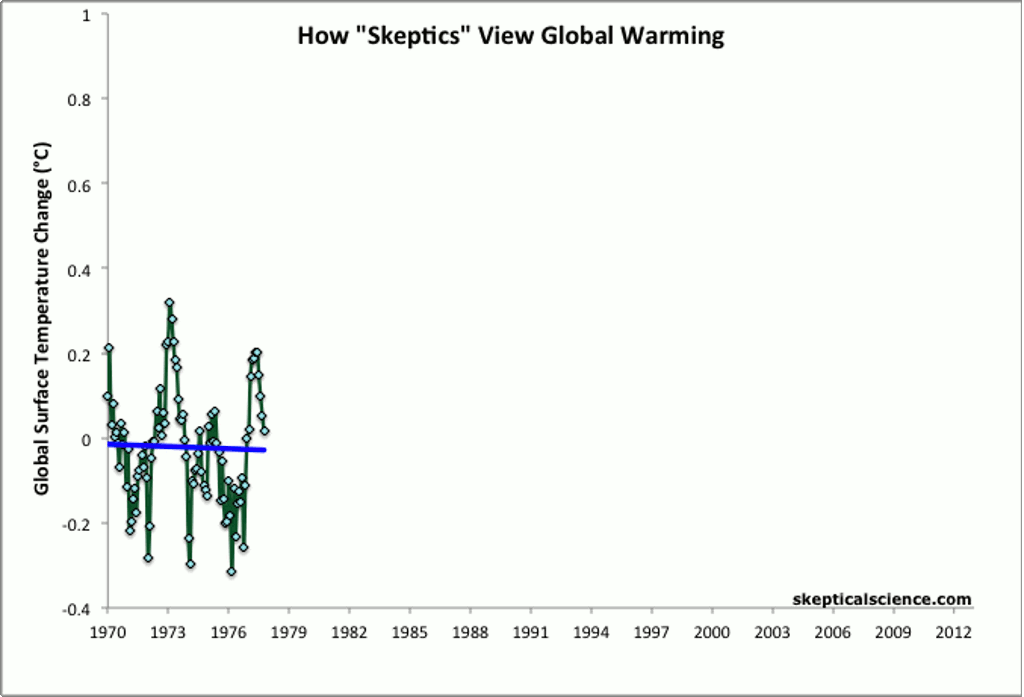 Image credit: Dana Nuccitelli of Skeptical Science, via http://www.skepticalscience.com/.
Image credit: Dana Nuccitelli of Skeptical Science, via http://www.skepticalscience.com/.
Other methods of showing global average temperature vs. time -- such as taking the average global temperature over each decade -- show the same, steady increase over time since the end of the 1970s.
The vast majority of the heat, by the way, isn't going into the Earth's surface or the Earth's atmosphere; that's just the places where it's easiest for humans to measure the temperature on Earth.
As you'd expect, given that the Earth's oceans have a low albedo, cover the majority of the surface, convect easily, and run around 2-3 miles deep on average, the vast majority of the heat increase has wound up in the oceans.
So, undoubtedly, the Earth has warmed, and -- to the best of our measurements -- it appears to be warming still.
There could have been other, natural explanations for this warming, such as increased solar output, which has been correlated with temperature increases in the past. But, in fact, the opposite has been happening, and the current solar cycle is showing substantially decreased solar activity, which should've resulted in a cooling effect, had all other things been equal.
It cannot be proven that human activity is the cause of global warming, but based on what we know about planetary science, Earth's atmosphere, human activity and the warming we're observing, it seems very, very unlikely that anything else could be the cause. Not the Sun, not volcanoes, not any natural phenomenon that we know of.
Next year, a broad scientific report (the IPCC's AR5) will come out, and they will be taking a full, in-depth look at this and other global warming issues. Now that you know that global warming is real, and now that you understand why it's really likely that it's caused by human activity, I hope you'll start asking what they right way is to start addressing this problem. I'd like for humans to live happily and successfully on this world for thousands of generations to come, and that starts with taking care of this world today. I hope you've enjoyed this series, and I hope you'll continue to join me on our journey through the Universe, near and far.

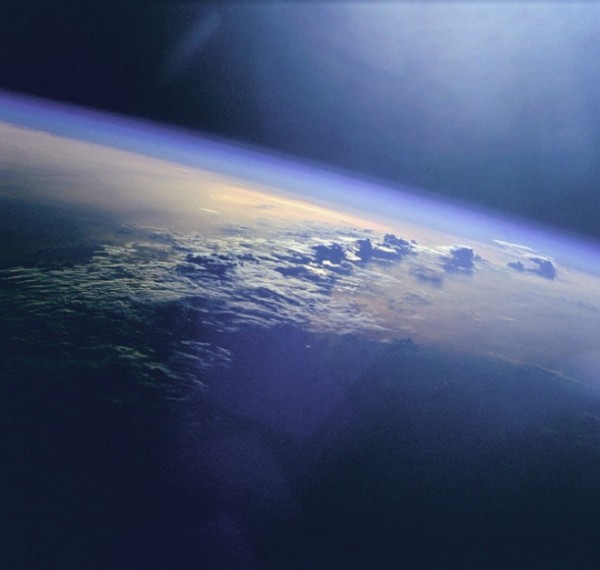
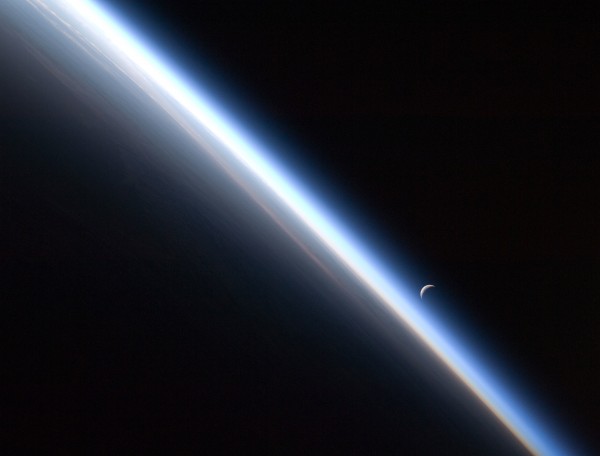
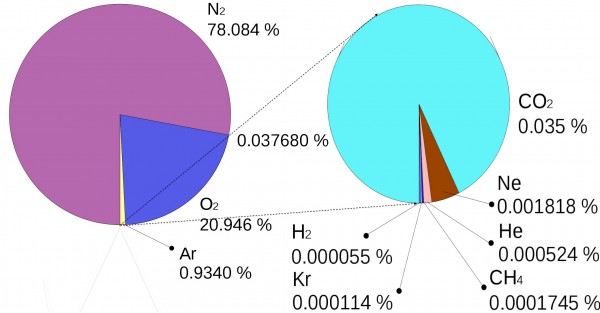

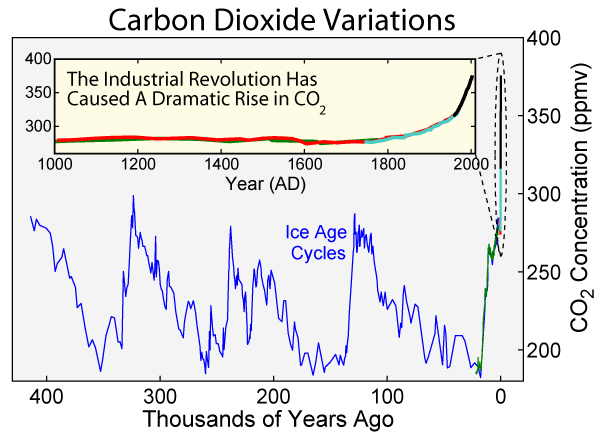
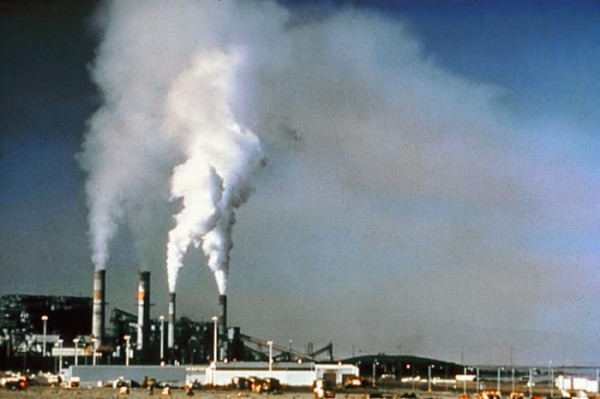
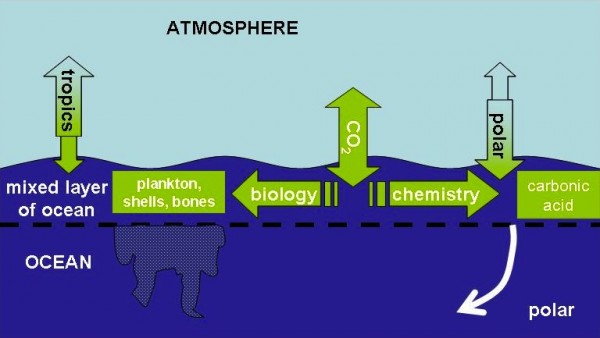

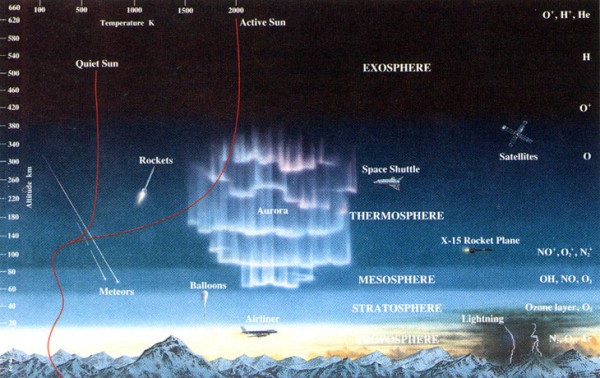
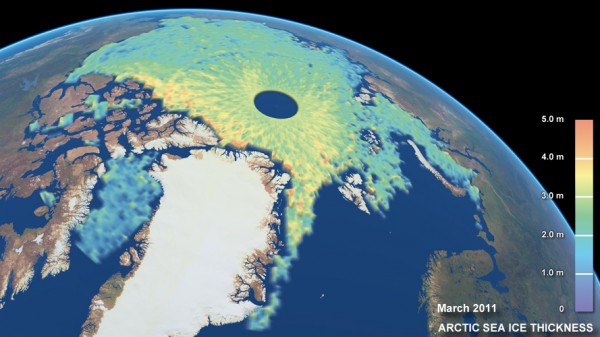
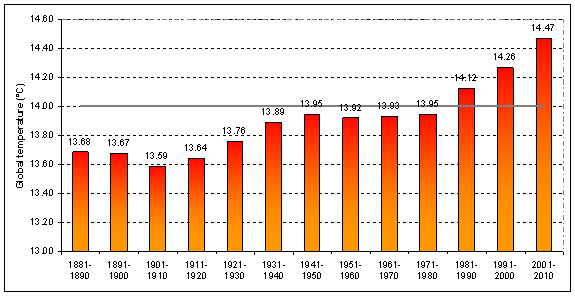
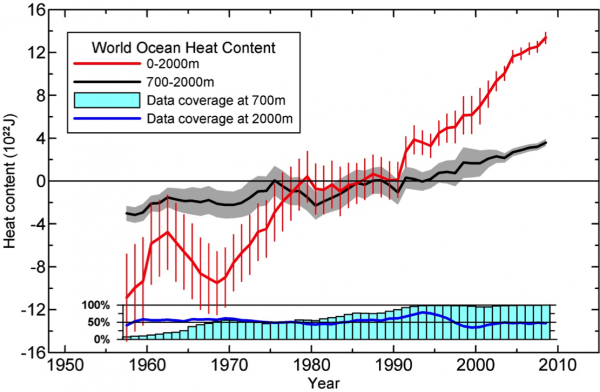
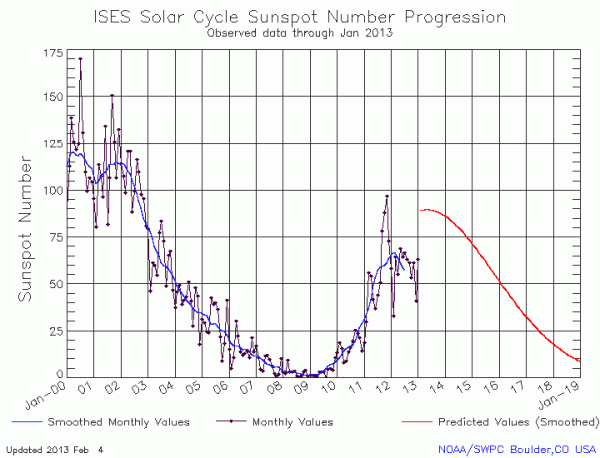
Excellent series! Thanks for taking the time to educate people who have difficulty accepting the scientific consensus of climate change.
People will accept scientific paradigms regarding their healthcare, even to the point of undergoing invasive surgeries. On the other hand they reject consensus when it conflicts with their worldview/ideology and requires a little expenditure of money in order to save the ecosystems of the planet.
Excellent discussion and presentation Ethan. Thank you for taking the time and expending the energy to educate others. It is so difficult to explain something with so many variables. You have done a very good job of addressing the basic components of the overall argument. The gift of a truly wonderful teacher is the ability to present complex information in a manner that is easily understood by everyone. Good job my friend. :-) C. Dianne Phillips
I'd steer clear of this if I were you, Ethan. The issue isn't whether human activity chucking out CO2 etc causes global warming. The issue is how much of a problem it causes, and how this compares with other risks, like overpopulation and pandemic or energy security and resource wars. Overpopulation is the elephant in the room. Scientific progress leads to increased carbon output per capita. More people and more travel increases the risk of a devastating disease. You could write an equally convincing blog on "Let's Ban Air Travel Tomorrow" or "No More Economic Development" or "Back to the Stone Age" or "Save the Children or Save the Planet". We've just had our coldest winter for 50 years. A pandemic would solve our global warming issues at a stroke. Our future and the risks we face isn't a simplistic one-meme subject, don't fall for the fallacy that it is.
John Duffield, your ignorance astounds. Yes, there are other problems in the world that will get bigger the longer we ignore them, but climate change is the granddaddy of them all, and it will make all the other problems much worse, as dense population centers are flooded and vital food production areas are struck by blight and drought. Sure, a pandemic that kills off a few billion people will relieve much of the pressure, but it would be good if we as a species could find a kinder solution before that happens. My vote is to round up all the science deniers and tone-trolls and bury them deep as a carbon sequestering project.
Don't engage duffield. He has a long history of downplaying the problems of climate change and commenting on how science "should work", all the while demonstrating he doesn't understand the topic. It is most amusing to see him repeatedly swing and miss here:
http://scienceblogs.com/startswithabang/2013/05/31/most-scientific-theo…
Thank you so much Ethan, it's wonderful to have someone finally explain this calmly instead of just screaming whatever their opinion is. When everyone in a room starts screaming, i can't hear anything no matter how hard i listen, it's the same when people scream about this.
I have two questions that have been bugging me for years and i'd love to know the answers.
How do we have accurate climate data from thousands of years ago? Soil samples?
Why is global warming also happening on Mars and Titan? Is this somehow caused by a different process?
I enjoyed this approach to covering the various aspects of radiation effects. It was a nice illustration of the parameters that are involved and the complexity of our particular situation. People are constantly choosing only a partial picture of the process with selective data to argue their preconceived bias without becoming fully aware of all that may actually be involved. (or caring to even learn)
Although I know I lack the intricacies of detail to to argue any side with eloquence, I have posted links to the "How Realists View Global Warming" animated GIF on many occasions when arguments were based solely on single-decade cooling cycles. I was amused to see it again here in the third installment of this series.
I never doubted the warming, but this gave me a better picture of the anthropomorphic contribution.
Good series as far as it goes, but it feels like we need a part 4 investigating areas of controversy and disagreement. After all, surely nobody disputes the facts that adding CO2 to the atmosphere will tend to cause warming? That'snot really where the controversy is.
Well said Steve.
FWIW Climate change obviously exists (we'd still be in the last Ice Age otherwise, wouldn't we?).
However, the obvious anomaly (elephant?) in the room (that is climate science) is the Earth's geothermal output, is it not?
The climate models all seem to either assume that it is a constant, or ignore it altogether (clearly neither is true).
Nobody I have spoken to, has been able to put an accurate number on the total geothermal output of all the volcanoes/vents/fissures etc above water, let alone those that are submerged beneath the world's seas and oceans.
Without accurate variables how can any equation work to any (real) degree of accuracy?
Consequentially the conclusions reached by using models that demonstrably do not include (or include erroneous values for) all the variables, have to be by omission, erroneous.
Is there even any accurate mapping (let alone accurate calculations of output) of all the Earth's geothermal vents/fissures/volcanoes etc?
GIGO (Garbage in, garbage out) would apply here, would it not?
It would seem variables in the models being used have been adjusted to give the required result without taking account of the planet's "internal heat source", how can this constitute good science?
Please can you demonstrate how accurate modelling is possible without accurate data to model from, the only conclusion to be drawn from bad modelling/science, would be a wrong conclusion wouldn't it?
Or are you claiming to have accurate figures for the Earth's total geothermal output in your model(s)?
Can you please supply the figures (if you indeed have them)?
Or lacking those, perhaps explain how the heat output from the planet's geothermal vents/fissures/volcanoes etc is prevented from affecting (or does not affect) the climate?
About CO2, don't ice cores prove that CO2 rises as a consequence of warming, rather than being a primary driver of change?
Also isn't CO2 a "fertiliser"? (it's my understanding that increased CO2 levels promote faster/better plant growth (and would that not raise the amount of atmospheric water (clouds), which being white, would reflect more solar energy, and thus regulate the planet's overall temperature (as well as presumably raising oxygen levels by increased levels of plant life and it's photosynthesis), or is that somehow wrong?
One last point, there seems to be a consensus in the "climate emergency clan" within climate science, that the Earth is supposed to have an absolutely stable climate that is presumed to be static at an optimum level to suit mankind, and that man's activity is somehow interfering with that, please can you demonstrate how the Earth's climate was (or is supposed to be) static prior to mankind's "tinkering with/messing up" the environment in general (and the climate in particular)", as the assumption IMO is grossly in error (and indicative of mankind's hubris in assuming everything revolves around mankind, I personally think if mankind died out tomorrow it'd not have any significant affect whatsoever to the Earth's climate or universe as a whole, others may of course assume our significance as a species is higher, but I have seen to date no evidence to support that assumption).
Can you demonstrate that the Earth's climate would become static if mankind were removed from the planet (/equation)?
I was taught it is good science to question hypotheses, yet it seems that in climate science that is discouraged, why is that?
Thanks in advance (and I hope my questions are not too tiresome for you to answer, they are asked in an effort to understand what looks (to me at least) like very bad science indeed.)
-O.O.
Alissa,
The study of the history of climate is called Paleoclimatology.
It uses quite a number of things to get data, wikipedia lists these: Rocks, sediments, ice sheets, tree rings, corals, shells and microfossils. When combined from all over the world and overlapped through time you will find they agree well and can provide good data on earth's climate.
Mars isn't actually warming. Basically, there is no evidence for it plus we already know what the sun is doing very accurately, using mars to measure that would be using a terrible instrument. The weather and climate on mars is determined by its albedo, which changes because it's a dusty planet. The Marsian year also takes much longer than ours, so you'd need even more data than we have on earth to compare it well.
I am actually somewhat curious to see what would happen if things continue the way things are, I mean the planet would be fine, it's just problems for humans that come about from the whole effect.
@Obscure Origins: I think most scientists would agree that CO2 and other gases do cause global warming. See what Ethan was saying about Mercury and Venus. But that's not the issue, it's an issue of degree, and of priorities. It's no good sitting there sipping a Bud looking up at the sky feeling all noble about global warming if you're watching some Deep Impact ELE. You've seen the movie, you've had the warning. But you did nothing because you took your eye off the ball because global warming absorbed your entire attention? Duh! You could say the same about a whole bunch of other risks. You know what I think the biggest risk is? That some joker will try to "save the planet" using the Twelve Monkeys solution. I've got children. That really bothers me. And something else that bothers me is that you hardly ever hear about it.
Obscure Origins,
For the first half of your comment you seem to use a lot of words about a topic you're convinced is important, ignored and not known. Yet you show no sign of having looked into it at all, which strikes me as a weird way to go about things.
At any rate, the energy that enters the climate via geothermal heat is roughly known. The reason why this isn't talked about everywhere is quite simple, the amount of heat it puts out is in the neighborhood of the amount of heat that's released from our energy production. That is, not the CO2 from the burning of fossil fuel but the actual heat. Both of these are very small compared to the effect of just the amount of CO2 we added ourselves: about 5%.
Not only that, there is no sign that this has changed recently and being a geological process, it wouldn't be expected to change quick either. Like having mount Everest appear from nothing in the span of a few decades.
The last half of your comment just consists of boilerplate denial arguments packaged up into a question. I won't even deal with them as unlike the first point these have been discussed and more importantly, explained, hundreds and hundreds of times whenever climate is mentioned anywhere online. If you're honest and you really don't know the answers you can easily find them yourself, in which case good luck.
Surething:
Thanks for the paleoclimatology explanation. About Mars: I'm sure I read that it was warming but it was years ago; unfortunately I don't have the articles. I don’t mean to disagree with you, but I am positive I read this more than once; perhaps it was an inaccurate conclusion based on the data? Is it now known to be caused by something else? (Is that what you meant by the albedo?) Also, what about Titan? I am more than convinced about global warming on Earth, but I don’t like data holes and I’ve noticed this one for a while. Maybe I’m just using old information that’s outdated, and in that case I’d like to be brought up to date :)
I just did a quick google search and found plenty of articles on this: http://en.wikipedia.org/wiki/Climate_of_Mars
Unfortunately, some of the other articles are politically charged and therefore I can’t trust them. Sigh.
However, some seem alright. This one isn’t screaming: http://www.theregister.co.uk/2009/11/30/titan_warming_cycles/
I think this means what is happening on Mars and Titan is caused by their respective normal climate cycles and is unrelated to Earth? Regardless, surely it’s worth discussing other examples of climate change and how they differ from Earth.
And I think I've found just the article: http://www.johnstonsarchive.net/environment/warmingplanets.html
This satisfies me with the answers and explanation the things that have been bugging me. Most of all it confirms my gut feeling that hardcore nuts screaming from both sides are BOTH wrong (and both partially right).
Thanks for your help surething! I love this site, it’s great to be able to ask these questions.
Thank you Ethan, I enjoy all of your posts and found this series particularly interesting. Your astronomical perspective adds a valuable perspective to the explanation of the science.
I am surprised that you site has not been inundated by the anti-science crowd though a couple of commenters have implied that climate sensitivity is low and therefore we don't have a problem.
It is unlikely that climate sensitivity (CS) is below 2 degrees C or above 4.5 degrees C (for a doubling of CO2). Most studies give a value of about 3 degrees. There have been a few recently that have proposed 2.5 degrees. Even if we assume that most of the studies are wrong and that CS is at the bottom of the likely range - 2 degrees - we are still in for a dangerous amount of warming.
Lets go further and assume that the obvious positive feedbacks, like reduction of ice sheets and increased water vapour don't exist; temperatures will still increase by 1.2 degrees C. Given that we are clearly headed for more than a doubling of CO2 then CO2 alone will likely provide a warming near 2 degrees C.
Interesting to see the ad hominem arguments aimed at me, eh "surething"?...
@ "surething", I am quite conversant with the debate, and have obviously raised a matter you are unable to deal with.
If you know what the total geo-thermal output of the planet is, say so.
"In the neighbourhood" isn't a number, its a vague stab in the dark (you are clearly unable to quantify your "neighbourhood", if you could your would have done) and have revealed you clearly don't know.
As you demonstrably don't know, just maybe you'd be better off just keeping quiet rather than trying to assassinate my character.
How does that (character assassination of people asking perfectly reasonable questions of those claiming authority in a given field) promote good science?
Presenting your evidence and/or questions is basically how science works (you have obviously confused the current state of climate knowledge with a theory that is completely understood, when in fact it's clearly still at the hypothesis stage (and you seem to be without the knowledge to answer my perfectly reasonable question(s).)
You may feel proper scientific method was observed with your childish name-calling (you've clearly called me dishonest/a liar).
I however disagree with your assertion and can now see you clearly have an agenda to try and push bad science.
Atmospheric CO2 is *not* a pollutant, nor is it the primary forcing cause of climate change, attempting to stop climate change is an (obviously going to be expensive) act of utter futility, as it is clearly a process of literally trying to stop the clouds crossing the sky in an act of hubris.
Just one of the aspects I find particularly worrying (in relation to the bad science (as practised by people like yourself)) is ...
Prof. Stephen Schneider, (RIP, former Stanford Professor of Climatology, lead author of many IPCC reports) said to climate researchers/IPCC members ...
"On the one hand, as scientists we are ethically bound to the scientific method, in effect promising to tell the truth, the whole truth, and nothing but — which means that we must include all the doubts, the caveats, the ifs, ands, and buts. On the other hand, we are not just scientists but human beings as well. And like most people we'd like to see the world a better place, which in this context translates into our working to reduce the risk of potentially disastrous climatic change. To do that we need to get some broadbased support, to capture the public's imagination. That, of course, entails getting loads of media coverage. ***So we have to offer up scary scenarios, make simplified, dramatic statements, and make little mention of any doubts we might have***. " (My emphasis)
That sounds awfully like telling people to promote what is demonstrably propaganda rather than the actual science/facts of the matter doesn't it ?
It's VERY hard for any reasonable person to believe people who quite openly admit to "offering up scary scenarios", "making simplified dramatic statements" and who choose to ignore basic scientific principals (like the sticking to the scientifically established FACTS) to suit their particular agenda (which at the moment looks like revenue generation by the process of bad science) and to favour name-calling over good scientific practice.
Scare-mongering and name calling has demonstrably now replaced (for you at least) good science and is clearly being used by Govts as "scientific justification" for tax-revenue generation!!!
Yet you feel you are in a position to call ME a liar!
You are demonstrably dishonest (as was Stephen Schneider), you have shown your answer to my questions is to try to discredit my questions by character assassination.
If your premise had veracity, why would you need to resort to name-calling?
"If you’re honest and you really don’t know the answers you can easily find them yourself, in which case good luck."(sic)
I spoke to an oceanographer at the weekend, who said (unequivocally) they don't have any numbers relating to the total output of underwater volcanos/fissure/vents etc, (which is what prompted my questions here), he's an expert but you have stated categorically (by what you have posted) that he is a liar.
It certainly looks like it's completely beyond your abilities to answer the simple question, and so you've resorted to argument ad hominem (and "bullsh*t") to try and appear authoritative...
What's that if not fundamental dishonesty and bad science?
I asked, you failed to answer, and consequentially have resorted to scientific and moral dishonesty, you must feel SO proud.
Good work, Ethan, and nicely presented. You're picking up a few more denialists/minimizationsts this time, but still fairly low on the junk scale, though OO seems to want to redress the balance. OO, I spent 5 seconds on the Google to find the link you wanted; http://volcanoes.usgs.gov/hazards/gas/climate.php
Now go away, reality is more interesting than your sludge.
OK: 44.2 TW, or 0.087 W/m^2 averaged over the whole surface. [Pollack, Henry N., et.al.,Heat flow from the Earth's interior: Analysis of the global data set, Reviews of Geophysics, 31, 3 / August 1993, p. 273 doi:10.1029/93RG01249]
You're welcome.
Nice series Ethan, I have avoid the stupidity of climate science way too political for my taste usually.
I have two questions that struck me looking at this last bit however.
The first one was the sunspot activity graph and it sort of assumed that I knew that increased sunspot activity should give more solar irradiance I would have naively guessed the opposite. I had to go check NASA sun gods and they actually say it doesn't change much at all 0.1% so do you have different data on that or you probably need to explain it a bit better?
http://www.nasa.gov/topics/solarsystem/features/sun-brightness.html
The second came to me later, the Levitus et al 2012 shows the heat building in the depths? Again this seemed weird as the heat would have to move down because the light would not directly penetrate. After doing a bit reading and avoiding climate science sites I got my head around thermocline and the Argo buoy data. Again either a better explaination is required or the Argo data is probably a better choice being a very direct measurement.
Actually had another question I just thought about above what mechanism brings all the heat back to the surface and air never actually thought about that and don't recall seeing it.
LdB: Yeah, naively you'd assume that since sunspots are cooler, more sunspots would mean the sun is emitting less. But increased sunspots are an effect of increased solar activity, and other parts of the sun get hotter and this effect is larger than the effect of the sunspots. And yeah, the total variance is small in percentage terms. Still enough to cause short term changes in global temperature but not nearly enough to explain the trend.
Obscure said, "That sounds awfully like telling people to promote what is demonstrably propaganda rather than the actual science/facts of the matter doesn’t it ?"
It certainly does....because you took it out of context--is that deliberate deception on your part or have you not actually looked it up yourself, but relied on deceptive sources? The very next sentence says,
"This ‘double ethical bind’ we frequently find ourselves in
cannot be solved by any formula. Each of us has to decide what the right balance is between being effective and being honest. I hope that means being both."
This is a far cry from him openly admitting to making up scary scenarios. Go and read the whole thing, not just the part you want to take out of context.
It took me 30 seconds to find the whole quote and see you took it out of context. An additional 10 seconds took me to an article (http://www.aps.org/publications/apsnews/199608/upload/aug96.pdf) by Dr. Schneider (scroll down to Don't Bet All Enviromental Changes Will be Beneficial), in which he points out how his quote has been dishonestly used. Here's some of what he says.
"What I was telling the Discover interviewer, of course, was my disdain for a soundbite communications process that imposes the double ethical bind on all who venture into the popular media.
***To twist my openly stated and serious objections to the soundbite process into some kind of advocacy of exaggeration is a clear distortion."***
(my emphasis). If you don't think it is a clear distortion, then again read the whole original quote yourself.
The next sentence in the pdf article reads....
"Moreover, not only do I disapprove of the “ends justify the means” philosophy of which I am accused, but, in fact have actively campaigned against it in myriad speeches and writings. "
So, he didn't say what you claim he said, and he's actively written and campaigned against the very thing you claim he's said (have you read Science as a Contact Sport?).
I think that pretty much tells us how reliable you are--if you can't get this straight-forward simple item correct on something that was first decisively rebutted 17 years ago, then you can't be trusted to be relay/tell the truth on the science (your other statements, by the way, are also mostly distortions).
If you don't want to be called a liar don't uncritically parrot what you've read on sites that confirm your existing biases, and don't deceptively distort easily checked quotes as if you're a budding member of the young earth creationist society.
Obscure Origins,
There was no character assassination intended. I didn't call you a liar, I left the option open you were merely ignorant of the facts and too lazy to read anything on it but denialist websites. This is actually very common so I'm quite used to that and I don't think most people who do that are liars.
However, now that you've stated you are "quite conversant with the debate" I will have to say you are dishonest. This is further shown by the quote you give. Because it continues saying: "This 'double ethical bind' we frequently find ourselves in cannot be solved by any formula. Each of us has to decide what the right balance is between being effective and being honest. I hope that means being both."
I will leave this for everyone else to decide on their own if this was fairly important context.
I won't bother defending someone else's quote from the '80s, the science is for all to see in the literature.
As for exact numbers and references I try to avoid those as links to websites hold up comments in moderation, but Dunc above has supplied you with it now so I won't have to bother.
Maybe next time you talk to an oceanographer or geologist suggest the heat flow has increased orders of magnitude in the last few decades and watch them laugh.
Our data on this may not be as much as we would like (though not zero as you suggest) but this is no reason to assume its not only inaccurate, but totally off.
If you were both honest and well informed, I wouldn't know why you would even bring this possibility up, as CO2 warming is very well understood and has a very distinct 'fingerprint' with many measured features that you don't get from other sources of warming.
More information on this here http://www.skepticalscience.com/human-fingerprint-in-global-warming.html
surething,
Thank you for that link; the fifth figure -- from Evans 2006 -- was one I wish I had found while writing this part of the post. Quantifying the re-radiance of atmospheric CO2 at night is a tremendously important part of the equation, and I was unable to track down exactly that sort of graph.
For those of you who don't want to follow the links, this is what I'm talking about:
Very nice find!
Hey Dunc, a ref from 1993? Did you forget the thousands of undersea hairdryers that have appeared since then?
Or did the other guy forget that heat transfer was the first thing measured by the first real climate scientist, Fourier? The one who "wrote the book" on heat transfer?
Obscure & nameless, first you seem pretty sure that CO2 is not the major forcing of climate change, so by implication the fundamental physics of matter-radiation interaction is wrong. Then you imply that the world's geologists are incompetent too. You can skip that part until you explain how radiation physics could be wrong and we can be here.
Climate science is indeed multifaceted.
http://www.easterbrook.ca/steve/2013/08/why-systems-thinking/
One of the things climate scientists study is boreholes.
http://scholar.google.com/scholar?q=Borehole+climatology
This helps them learn, among other things, how much heat is transferred *into* solid earth and ice when, say, CO2 increases.
John Duffield, you say among other things
"We’ve just had our coldest winter for 50 years."
Who are you calling "We?" Where I live it was quite a warm one. But let's think globally as we should. Look at the temperature graphs Ethan gave us. Do you really believe it was never colder in winter within the last 50 years?
Then you say
"A pandemic would solve our global warming issues at a stroke."
Well we had one in 1918. Didn't work.
http://en.wikipedia.org/wiki/1918_flu_pandemic
Steve Morris writes:
"Good series as far as it goes, but it feels like we need a part 4 investigating areas of controversy and disagreement. After all, surely nobody disputes the facts that adding CO2 to the atmosphere will tend to cause warming? That’snot really where the controversy is."
Yes that is where the controversy is. It's there and everywhere else over and over. And over. The long form is here:
http://skepticalscience.com/argument.php
and I'll give the outline of generic denial.
A. It isn't happening.
B. It is not our fault (or Anything but CO2)
C. Doing anything about it would be to much trouble or too costly.
all aimed at
D. Delay
There is about five times as much reduced carbon still underground but already on the books - the balance $sheets - of Big Carbon as can still be burned without very probably hurting ourselves. The want to burn it all, or at least as much as they can before we seriously "do something about it." They understand what "do something" really means:
Stop Burning Carbon.
Leave it in the ground and do not burn it.
This means writing off vast fortunes already on their balance sheets. With all that lovely money at stake,
http://www.youtube.com/watch?v=YRU-tmeixC0&feature=player_embedded
@Pete Dunkelberg: I live in the UK. There's been some issues with temperature graphs - hockey sticks and all that. Don't get me wrong, I'm not saying human activity cannot cause climate change, what I'm saying is that it isn't the only risk we face, and we have to make sure that preoccupation with it doesn't distract us from other issues such as overpopulation, resource wars, deep impact, pandemic, etc. I'm frankly appalled by Artor's comment above where he said "Sure, a pandemic that kills off a few billion people will relieve much of the pressure". It's so casual and uncaring.
No, no there hasn't, except in the minds of deniers.
Ah, "denier". Don't you just love that word? It makes me think of some foam-flecked fat bishop with a mitre pointing the finger and crying "Heretic!" There's just no talking to people like that. Try to explain that the issue is how the risks stack up, and they don't want to know. They just shrug at the prospect of billions of people dying from a pandemic. That's not important to them compared to the shock horror of world temperatures rising by half a degree. Crazies.
John, it is clear that you have no understanding of climate change - your glancing shots about "problems" with the hockey stick shows this clearly. Since you haven't explained anything about "risks stacking up" it isn't clear what you mean there.
And the shrug about a pandemic - do you mean nobody is working on highly communicable, dangerous diseases? Clearly a lie. Are you lamenting the fact that nobody is working on something that doesn't exist other than in your imagination? That is your problem.
@Pete Dunkelberg and Steve Morris
That "Part 4" you speak of would be a difficult addition to this series as it is relates not to scientific investigation, but to a peculiar human tendency to simply not believe it.
If a mathematician states:
"A + B = C, so C - A = B" and a person says "Oh no it don't." then how in the hell is a a mathematician going to go about dealing with that kind of mindset?
This is a psychological problem which prevents any semblance of rational discussion. What would a rational guy like Ethan have to say about that kind of dysfunction? What's worse is that it would only get those same people to start incessantly arguing with that same irrational mindset.
Ever try to have a discussion on CNN?
"How do we have accurate climate data from thousands of years ago? Soil samples?"
Ice cores, tree rings, isotope analysis. Michael Mann's work is pretty much the seminal work on this, go read it.
"Why is global warming also happening on Mars and Titan?"
It isn't. Mars is in a different orbit, we haven't got 30,000 stations measuring it directly for 100+ years.
This is, IIRC, denier myth 34.
"Is this somehow caused by a different process?"
Yes.
Much the same way as my grandad died for a different reason to my Uncle who died.
This is quite normal for a procedure that has many different causes.
"After all, surely nobody disputes the facts that adding CO2 to the atmosphere will tend to cause warming?"
Nope, there are still many very vocal people insisting it isn't CO2.
"However, the obvious anomaly (elephant?) in the room (that is climate science) is the Earth’s geothermal output, is it not?"
No, it is not.
Even Jupiter, with the highest self-luminescence of any planet in our solar system has a couple of percent from internal processes.
Surely you would have checked that this was or was not the case before asserting it, wouldn't you?
"I had to go check NASA sun gods and they actually say it doesn’t change much at all 0.1% so do you have different data on that or you probably need to explain it a bit better?"
Solar constant is ~1500w/m^2 at earth radius. 0.1% of that is 1.5W/m^2.
Compared to the forcing from 10 years accumulated CO2 output, at ~-.9-1.2W/m^2 (assuming 2ppm increase) you can see easily that any one decade can be countered and more by cherry picking a "hot sun" year and a "cold sun" year.
Like, for example, 1998 and 2011.
"The second came to me later, the Levitus et al 2012 shows the heat building in the depths? "
The La Nina/El Nino cycle is caused by upwelling (or not) of deep water from the cold depths cooling the atmosphere by putting a lot of cold water next to it.
That heat doesn't disappear.
It goes down deep.
Later it will come back up again. This is why that is called "a cycle". This, however, much like the solar cycle, is asserted to be only one way by deniers.
There's not a lot you can do against teh stoopid, though, apart from take the piss out of it.
John Duffield:
Yes, by all means let us not let the issue of climate change distract us from the important issue of natural resource distribution. [facepalm]
When you wrote your sentence (quoted above), (1) were you ignorant of the fact that climate change will likely exacerbate the resource problem, or (2) did you know it and just choose not to mention the connection?
I knew it eric. I just didn't think to mention it because AFAIK population is the biggest issue when it comes to resources. World population is expected to increase by something like a third in the next thirty years.
John,
This paper Says that population will top out at around 10 billion. The carrying capacity of the earth in terms of human population has estimates anywhere from 4-16 billion with a median of 10 billion. I think that we are going to be OK in terms of overpopulation, what is not OK is that climate change is going to affect the carrying capacity of the earth negatively (flooding of coastal regions, decrease in viable rain fed agricultural regions) as well as the chance for pandemic (increased temperatures, greater crowding of population centers due to flooding of coastal regions).
Wow: Already had the discussion with surething. see above.
and I'll add to that, surething actually explained it. nicely.
Ethan help I am still stuck with the nasty problem you haven't answered from above it is a simple question I think is vital and is there an agreed answer. I have tried googling it but OMG climate science, trying to get thru all the garbage is a full time job.
So I can see most of the energy of global warming is going to end up in deep oceans, I didn't appreciate that before because of all the drama around climate science.
Question: Does it come back up or do bad things in different time frame or is this one of those earth equilibrium mechanisms.
I find it really weird that I can't get a straight answer given that this is where the bulk of the energy is going shouldn't this stuff be known?
Apparently skepticalscience.com contrary to it's name is a very pro climate science site and I like its layout but even it gives a nebulous answer with no real data or predictions
http://www.skepticalscience.com/A-Looming-Climate-Shift-Will-Ocean-Heat…
Doug: all points noted. But note this: there's controversy about how much temperatures have risen, or will rise. There is no controversy about population growth of about a third in the last thirty years. What if that paper turns out to be wishful thinking?
"Question: Does it come back up or do bad things in different time frame or is this one of those earth equilibrium mechanisms."
Both.
"I find it really weird that I can’t get a straight answer "
Because the query isn't well formed and the answer you get is refused as wrong because you can't work with it.
It's both. When you heat water up to boil it, convection will move heat around. Without convection, the bottom of a warmed pot will be hotter than it gets with it, because the rest of the liquid is an energy sink and extracts the energy and puts it where you're not measuring it.
If you then try to cool the pot from the same place you warmed it, the mass of that warm liquid and the ability to convect and mix the heat around means that your cooling attempt will be less successful because you have that huge reservoir of energy now able to give back heat.
Moreover, your claims that this is somehow central to everything remains entirely opaque and uncaused. Care to explain?
"and I’ll add to that, surething actually explained it. nicely."
And I'll add that you've been told this "nicely" before, but it hasn't taken because you're frankly unconcerned with learning, only with complaining.
Boo hoo.
"Apparently skepticalscience.com contrary to it’s name is a very pro climate science site"
Apparently you don't know that science is inherently skeptical.
Apparently you think contrarian is skepticism. It is not.
I am not a denier, but I do have one question. We have been burning fossil fuels for several centuries now, and have been doing so on a large scale since the mid 1800's or so. Why then did the CO2 concentration remain relatively stable until the 1970's or so? (I could ask the same question about global temperatures, but since CO2 rise causes increasing temperatures, the answer would be the same).
Is there some "tipping point" mechanism that I am unaware of? Is it just a matter of degree, although I am unaware of a truly significant increase in CO2 emissions starting in the 1970's vs earlier years? Is it just an effect we don't understand yet? Is it something else that I have not thought of? Thanks in advance, and please don't crucify me; I am actually asking this as an honest question, not as an attempt to try to deny global warming.
It didn't remain relatively stable, Sean.
Pop along to the IPCC website and see for yourself.
The warming resulting from the increase in CO2 ppm increased, but that's because the warming is the result of cumulative additions.
Go along to http://www.skepticalscience.com and look at the list of common denier memes and you'll see why "1970's" was "cool".
It's not as if it's new. In the 1980s, it would be reasonable for someone not to have gotten the information, it was really in the 80's that the science really settled on the "Yes" answer to "Is AGW real?".
In the 1990's, you could be given a bye if you'd avoided the whole issue.
In the 2000's, it was all out there for perusal to anyone wondering.
In the 2010's, anyone genuinely worried would have a plethora of things to look through and a vast array of options for finding this stuff out. And, most significantly, 20 plus years to do the bloody research.
If you're still asking questions that had been answered in the science journals 30+ years ago, I doubt whether the query was validly asked. More likely is that it's just something thought of right now to go "Well, I'm not ignorant *deliberately*!". You can think up questions you've never asked before, but that they aren't answered doesn't make them legitimate query. They're avoidance.
Sean, as an example of how "avoidance" is an apposite appraisal of your query, ON THIS VERY THREAD above the line is the graph of CO2 concentrations with an inset for the last few centuries in detail.
"Steady for the 400 years previous to 1700" would have been at least vaguely defensible. Steady up until 1970 is 100% indefensible.
That you did not even check your preconception against the thread you commented on indicates your concerns are avoidance not illumination.
Sean, as an example of how "avoidance" is an apposite appraisal of your query, ON THIS VERY THREAD above the line is the graph of CO2 concentrations with an inset for the last few centuries in detail.
"Steady for the 400 years previous to 1700" would have been at least vaguely defensible. Steady up until 1970 is 100% indefensible.
That you did not even check your preconception against the thread you commented on indicates your concerns are avoidance not illumination.
Wow,
I am looking at the graphs. According to the graph Ethan posted above, the rise in global temperature between 1800 and 1970, for instance is about 0.5 degrees C. From 1970 to 2000 the rise was 1 degree C. (depending of course on how you mentally draw the trendlines into the fluctuating data).
1800-1970 is 170 years, and there was a rise of about 0.5 C. That's an average of around 0.003 C per year. 1970-2000 is 30 years, and the rise was 1 C. That's an average of about 0.03C per year, or a full order of magnitude greater.
That's what I was asking about. I used the term "relatively stable"; I did not mean flatlined for the prior years. I am also not aware that CO2 emissions increased 10-fold suddenly during the 1970's (although they may have; that may be the answer). I am certainly not trying to argue about the reality of global warming. I am just trying to ask a question about something I noticed in the data.
WOW I will ignore you usual pratt comments but explain I totally agree with your boiling pot example but in our case we are heating from the top, no real difference. The bottom layer of the ocean is very cold (typically below 4deg C) and it hence has a lot of capacity to store heat.
Given we have global warming the top will never get cooler so the deep ocean will continue to take in extra heat. The current estimate is what that 90% of the heating is going there?
So at one level you would say there is no problem earth has a nifty equilibrium process BUT
http://en.wikipedia.org/wiki/Thermohaline_circulation
The meridional overturning circulation usually brings up that deep cool water on slow timescales something like 1600 year max timespans from what I read.
So at some time in the distant future the meridional overturning circulation is going to bring up warmer water than it used to OR option B the thermohaline drive process will stop.
Now the climate scientists seem to understand all that and agree with as did Ethan's article above, except he stopped short of explaining the problem of the deep ocean heat and its ramifications as far as I can see.
So I guess another question I could pose is why are climate scientists spending so much time and effort arguing with anti-AGW people over surface temperature and spending more money on it when the biggest part of the problem is going into the deep oceans?
Quote=WOW
Moreover, your claims that this is somehow central to everything remains entirely opaque and uncaused. Care to explain?
Does that explain my concerns?
BTW,
I did the math for temperatures. I see a similar trend in the CO2 graph that you refered to. There is a rise from 1800-1970, but that rate of increase is much slower than the rise from 1970-2000. (I haven't done the math on it, so I don't know if it's of the same order as the difference in the rate of increase of temperatures.)
Of course, that's to be expected since it is the rising atmospheric CO2 levels that are causing the rise in global temperatures. Providing a reason for the higher rate of increase in CO2 levels would provide the reason for the greater rate of increase in global temperatures as well. It may well be as simple as that the carbon emissions really did increase tenfold during this time, but I have never seen this addressed anywhere.
Sean T,
You're confusing some things here.
In your first comment you asked why the CO2 concentration remained relatively stable, but now you're talking about the temperature. So I think you've been looking at the wrong graphs. For the CO2 concentration look at the 6th image in this article, there you can see that it has been going up exponentially from at least 1800.
As for the temperature, it's more complicated.
Now it has seen a sharp incline since 1970s and the reason for this is aerosol concentration in the atmosphere. It's particle pollution that reflects light back and therefore has a cooling effect. More on this here http://www.skepticalscience.com/global-cooling-mid-20th-century.htm
One other thing to remember is that the temperature lags behind the CO2 concentration. Even if we didn't increase the CO2 concentration a single PPM more starting now, it would still warm the planet considerably because we aren't in equilibrium yet.
Surething,
Thanks for the explanation about the particulates, but that does not explain the greater rate of increase in the CO2 concentration in the last 30 years vs the previous 170.
Just using estimates from the given graph, I estimate that the atmospheric CO2 level was about 250 ppm in 1800, about 325 ppm in 1970 and about 380 ppm in 2000. From 1800 to 1970 the increase was 75 ppm. That would be an average of about 0.4 ppm per year. From 1970 to 2000 the increase was 65 ppm, or an average of about 1.8 ppm per year. This is less of a difference than the tenfold one seen in the temperature curve, but your explanation about aerosols may well cover that.
My question is why did this jump occur around 1970 (and just for reference, I am looking at the black portion of the curve shown on the graph in this post) and not some other time. The 1970's, if I recall my history right, were not really a time of great industrial production, what with stagflation and all. The 1940's and 1950's were probably a time, for example, where industrial production was greater, especially with the wartime production in the 40's. Why did we not see this type of jump earlier? The rate of increase in atmospheric CO2 concentration should be proportional to the CO2 emissions, or am I mistaken here?
Like I said before, the answer may well be that we just emitted much more CO2 during the time around 1970 or so when the rate of increase seems to take a jump. There may be some other factor giving a "tipping point" scenario where some equilibrium-maintaining process becomes overwhelmed by further CO2 emissions. It may be something else entirely, but it's something I've never received an answer to, and it's just a question I had. I have no doubt about global warming, just wondering why this sudden jump occurred at the time that it did.
The rate of increase of CO2 was itself increasing since the industrial revolution. CO2 has been experiencing exponential growth since then. All you're seeing in the 1970s is a continuation of that exponential trend, not a fundamentally new one.
"Wow,
I am looking at the graphs. According to the graph Ethan posted above, the rise in global temperature between 1800 and 1970, for instance is about 0.5 degrees C"
Uh huh.
And your query was:
"Why then did the CO2 concentration remain relatively stable until the 1970′s or so?"
I emphasised the appropriate words.
"but that does not explain the greater rate of increase in the CO2 concentration in the last 30 years vs the previous 170."
Hmmm.
What has the increase in industrial output that has increased far more in the last 30 years than the previous 170 done for CO2 production, do you think?
Note that the effect of CO2 production on CO2 concentration delta is cumulative. So the last 30 years sees the contribution of the industrial revolution that STARTED 170 years ago PLUS the contribution of the vast industrial output that the last 30 years has seen.
Thinking: try joining it up.
" but in our case we are heating from the top, no real difference."
We're heating the ocean from one side and the cooler side is opposite.
Any analogy can only analogise that which the analogy holds and if the analogy were to hold for every case, it would not be an analogy, but the actuality instead.
The oceans are a lot bigger than a cooking pot and the ocean floor has a lot of different processes going on that insist on moving all that water about. A famous one being the gulf stream, but there are many gyres in all the great oceans that do the same thing: pull water up against the thermal gradient.
The analogy was brought up not to demonstrate how the ocean body can be a source and brake on warming, but to indicate that the capability of thermal inertia to be both a source and brake on changing the thermal content of a body.
You will likely be able to find ones better fitting to a mechanism than a cooking pot, but all I wanted to do was show how "Both" was the accurate answer by indicating how it can be "Both" if a common item were to be replaced in the scenario.
"The 1970′s, if I recall my history right, were not really a time of great industrial production, what with stagflation and all."
Which is why the subsequent 30 years has a greater effect than the 70's: the 90's included the 20 years following PLUS the effect in the 70's.
Moreover we have in the 70's legislation that worked again: clean air acts. It was another case where industry alarmists predicted doom and gloom, cats sleeping with dogs, oceans of boiling blood, etc, if anything were done to change The Way Things Were.
But they happened anyway and, surprise, surprise, the doom predictions failed and the legislation worked.
"The 1940′s and 1950′s were probably a time, for example, where industrial production was greater,"
Nope, not really. For a start, check how much coal and oil were sold during those days and compare to today.
Secondly, CO2 did increase a lot.
But are you talking about CO2 concentrations or temperatures, because you chop and change what you're complaining about in a pure gish gallop avoidance.
Because if you're talking about temperatures, then you're going to be surprised by this revelation: there is more than just CO2 involved in temperature.
Deniers do this: they complain about how it's not all CO2, and that the IPCC are wrong to ignore all the other effects. However, this is 100% false. But the deniers then go and pretend that they think that ONLY CO2 can affect climate temperatures to then make up a complaint about how they're honestly confused and totally not a denier.
Falling foul of the complaint they ignorantly accuse the IPCC of because, as said (and displayed) so often on another scienceblogs blog: it's all projection.
ANYONE who has a query about the science SHOULD NOT SAY A DAMNED WORD on the subject until AFTER they have read the IPCC reports on the science in WG1.
You, sir, have not.
"Does that explain my concerns?"
Nope.
You've gished on to another complaint. EVERYTHING you've wondered about has been discussed for at least a decade, and some for several decades. So I'll ignore the "new factors" you've brought in to the sound of a thunderous WHOOSH! of moving goalposts.
Trenberth's oft-quotemined "Missing heat" is about how the ocean network could not manage to discover the temperature of the ocean deeps. Technology affordable to the world's meteorological offices could not sample below 700m because the depth would rupture the instruments.
So now they have instruments that can last to 2000m depth cheap enough to determine approximate climatologically useful temperature profiles.
Now the climate scientists seem to understand all that and agree with as did Ethan’s article above, except he stopped short of explaining the problem of the deep ocean heat and its ramifications as far as I can see.
As far as I can see, you haven't said what "the problem" is. You really need to explain what "the problem" is before that claim can be asserted to truth or falsification.
That should have been a quote from you, LdB.
> Now the climate scientists seem to understand all that and agree with as did Ethan’s article above, except he stopped short of explaining the problem of the deep ocean heat and its ramifications as far as I can see
John,
" There is no controversy about population growth of about a third in the last thirty years. What if that paper turns out to be wishful thinking?"
But there is quite a wide variability of predicted population going forward.
Sean T,
Wikipedia provides a graph showing both the concentration of CO2 and the carbon flux, or fossil fuel emissions here http://upload.wikimedia.org/wikipedia/commons/5/52/Carbon_History_and_F…
As you can see it has kept going up and keeps on adding to what's already there.
Sean T @61:
The U.S. is not the world.
In China in the '70s, industrial growth was around 8% per year. Between the '60s and the '90s, China went from 60% of its workforce being agricultural to under 30% of it being agricultural.
But I don't mean to claim that China caused some huge unexpected uptick. As CB points out, you're not seeing anything in the last 40 years except the continuation of a smooth exponential growth curve. No new or different causal factor is needed to explain why an exponential curve exponentially increases in slope.
Alas, the screaming and insults begin. Everyone take a hard look at the reason this important, vital cause doesn’t yet have the support it deserves. The childish antics of some (you know who you are) gain attention, but not support. THAT is what we need to fix so the world will hear us. Thank you to the majority of posters for behaving like civilized people of science.
On the internet, nobody can hear you scream. So that screaming you hear is inside your own head, Alissa.
Insults? No. Honest appraisal and accurate assessment to which you have no other "defense" than to act all martyred.
Concern trolling has been attempted by thousands in the drive to have nothing done to make people cough up for the cleaning up of their acts. It's never worked before, it's not working now, dead.
The reason why there isn't the support needed is because arseholes don't give a shit for anyone but themselves.
And even if you were honest in that the only reason you don't accept the science is because you've been impugned on the internet, how does it look to rational people.
There's a case that could cause death and misery to billions of people and entire generations of children. But because YOU have been insulted, you'd prefer to let them die just to punish anyone for insulting you.
Does that sound like a mega-sized baby throwing their toys out of the pram in a tantrum?
You betcha.
US manufacturing trended up through the 70's, As did World Wide manufacturing. (as did poulation)
http://blogs-images.forbes.com/jonbruner/files/2011/08/value_added-larg…
(among other sources)
Additionally cars became less efficient in terms of Carbon prodction in the US in the early 1970's (combustion ratios dropped dramatically to support unleaded gasoline) at the same time the number of cars on the road increased.
Thanks everyone for your answers.
Wow, I really can understand why your tone is insulting toward me; you are used to dealing with deniers and I can understand why you thought I was just one more. I can assure you I am not. I was sincerely coming from a position of ignorance and had questions. You were right to call me out on not doing more research myself. However, there are only so many hours in the day and the ICC report is a large document. Thank you for pointing out my errors.
eric, good point about world-wide economic activity. However, that's where I'm a bit pessimistic about our efforts to combat climate change. The western world is not the world either. I think most developing nations would resist any effort to combat climate change, seeing it mainly as an effort on the part of the developed nations to avoid having new competition in the global market place. Obviously, I could be wrong and leaders in these countries may be more far-sighted than I give them credit for; let's hope that's the case. I am pessimistic, though, because leaders in the developed world so far have not shown the foresight to get anything serious done on climate change.
I'm also not sure that human nature will allow any real progress to be made. Many people, when confronted with a choice between giving up something right in front of them in order to avoid being harmed later or indulging in the present and causing themselves future harm will choose to indulge in the present. If you don't believe me, then explain why people drink, smoke, use drugs, overeat, etc. All of those choices are ones where people choose to indulge in the present and suffer future harm. I'm not suggesting that we give up trying to combat global warming, but perhaps effort should also be put into helping society adapt to a planet with a significantly higher global mean temperature. (Obviously there may be such efforts underway, but it does seem that efforts to combat warming receive more attention, at least to those of us who aren't experts on the subject).
Surething: thanks for the wiki link. That pretty much answers my original question; the rapid rise in CO2 levels is caused by the rapid rise in CO2 emissions. Obviously, then the rapid rise in CO2 emission would then cause rapid increases in global temperature (of course I realize that there are other factors, but CO2 levels do cause temperature rise). I sort of suspected that this was the case, but I wasn't entirely sure that there wasn't some other cause going on; the earth is a complicated system and it's certainly possible that other effects were complicating matters.
Your graph does lead me to other questions that I think are interesting, though. (at least from my position of ignorance; many pardons if these are stupid questions). Immediately before 1950, there is a decline in the total flux of CO2, but not a corresponding decline in fossil fuel burning. What would account for that? It would seem that there must either have been a decline in CO2 sources other than fossil fuel burning or there would have to have been an increase in CO2 absorption somewhere in the global system to account for this. Does anyone have an explanation?
Another question: the CO2 flux (both total flux and fossil fuel emission) follows and exponential distribution as does the atmospheric CO2 level. However, the atmospheric level seems to more smoothly follow this distribution than do the flux curves. Is there a reason for this? My initial thought is that the fluctuations in the flux curves could be due to measurement uncertainties. It is certainly easier to measure the CO2 level in the atmosphere than it is to determine the total CO2 emitted from fossil fuel burning and to account for global CO2 balance. I just wondered if there was another mechanism that I was unaware of that would account for this fluctuation.
Final question: I may be all wrong here, but to my eye it appears that the atmospheric CO2 level curve lags the flux curve by a couple of decades or so. For instance, both curves start to rise from their pre-industrial stable values around 1850 or so. Both curves rise pretty linearly for some time, but then both curves show a significant change in slope. That slope change appears to me to occur just before 1950 for the flux curves, and around 1960 to 1970 or so for the atmospheric CO2 level curve. What factors might cause a delay between the emission of CO2 and the increase in atmospheric CO2 levels? (Or am I just reading the graph cockeyed?)
"you are used to dealing with deniers and I can understand why you thought I was just one more."
I wasn't thinking you were one, but that you could be one and that your methods were appropriate to one. "only an idiot would say something like that" is as much advice to avoid that sort of thing as censure. Same here.
Most deniers haven't even read the first thing about the science, and they really need to do so.
People who, at this point in time haven't clued in on even the basics of the science really need to read the science too.
Both types need to read the IPCC WG1 report on the science if only to get the idea of what is in the science.
The advice to do so is absolutely 100% genuine.
And again, 100% advice is to get your query down pat. If, as you've done here, flip-flopped between "CO2 concentration" and "Temperature anomaly", then it's 110% no wonder that you've never gotten an answer to your question: not even you know what the hell you're looking for.
Again, this would at least be informed confusion if you popped along to the IPCC reports at
http://www.ipcc.ch
and read the WG1 reports.
NOTE: I don't think LdB is actually a denier.
This doesn't mean you two don't get a faceslap just as a died-in-the-wool (misspelling deliberate..!) zombie denialist like Alissa.
Don't chop-and-change.
Get your question worked out beforehand.
Get the point of an answer worked out beforehand.
Check the prime literature (IPCC again, they do a lot of work to collect and collate "the state of the art". USE IT) first.
Now, armed with a better understanding of both the science and what you want to know, you'll get an answer that you're looking for.
As it is, nobody can tell whether your query is answered because not even you know what it is and why it needs to be answered.
Denying Global warming and its identified mechanisms is a bit like denying that your refrigerator cools the food you put inside it, or ascribing that it works using some mechanism that has nothing to do with thermodynamics.
The original goal behind the Climate Change denial was economic - and thus political. Even its architects sought to intentionally cloud correlation rather than to really explain the data.
After the denial movement got big enough the "skepticism" fed on itself, people decide their stance first - then look for paterns that arent theire, drawing in perceptional annecdotals that don't even exist.
It really was a brilliant campaign if you look at it from that perspective. Athough it is more social science than geoscience.
Doug: yes, there is quite a wide variability of predicted population going forward. But "according to United Nations population statistics, the world population grew by 30%, or 1.6 billion people, between 1990 and 2010". That makes the temperature graphs look like a storm in a teacup. You're doubtless aware that birth rates go down when living standards go up. What if living standards start going down? And down, and down, and down...
What if living standards start going down? And down, and down, and down
===================
That question/statement is speculative at best -- that fact that rates go down as living standards go up does not necessarily mean they will go back up again if living standards were to go down.
On a larger scale human pop growth rates were very low until humans needed labor for agriculture -- they then grew -- and then declined as urbanization and modernization began.
What they will look like in an increasingly urban world of slim food surpluses and even deficits - is a much bigger question than simply reversing the developing country trendlines.
"That makes the temperature graphs look like a storm in a teacup."
And if you look at the relative sizes of the Empire State Building and the world's fattest man, you'd be thinking "He's not so heavy", right?
I think the teacup analogy is a bad one regardless.
Unless something changes, increases in population will continue to lead to increase carbon dioxide emissions- making the "teacup" larger and larger.
Increased population led to the warming in the first place, further increasing it will just snowball the effect. By definition, you cant separate population growth and anthropomorphic climate change.
that should read -- anthropogenic
I didn't watch my spell check closely enough.
But a "teacup" of Africans is about a tenth of the size of a "teacup" of USAians.
And the teacup can be reduced more in size by each drop doing its bit to reduce the size of the cup.
If the teacup uses zero carbon, then the size of the teacup is zero for one person or a quadrillion.
"Increased population led to the warming in the first place"
WRONG.
The reason why this "elephant in the room: population" is so popular is due to two things:
1) It's now someone else's job to fix it, not one of these elephant hunters thinks of reducing the population by one: themselves.
2) It can now be blamed on the third world, since their populations are growing whilst the first world (producing most of the pollution) are shrinking.
A double whammy: SEP and "it dem furiners".
“Increased population led to the warming in the first place”
WRONG.
====================
How so?
While I get and agree with your point it is possible to have a much lower footprint per person -- that isn't how it happened.
What happened is that as populations increased carbon footprints per person also increased. Some countries of course were far more wasteful tan others.
Even looking at just food - of which the US is a major exporter -- it takes a lot of fossil fuels to produce what we need to feed the current population.
Whether you are reading Ehrlich or Rickover they both agreed Energy = food.
Add demand in for other goods .. and it just gets worse.
----
This is what i meant about "unless something changes" I can envision a world where we have a much smaller CO2 per person and we get by just fine with a much larger populations - but it isn't like the one we live in.
"“Increased population led to the warming in the first place”
WRONG.
====================
How so? "
Babies, thought seemingly created in a factory, do not require fossil fuels to run.
"What happened is that as populations increased carbon footprints per person also increased."
You mean as the industrial revolution continued and science (especially medical science) helped people survive more effectively, that industrial revolution also increased CO2 use?
Or do you think that thunderstorms curdle milk?
Babies, thought seemingly created in a factory, do not require fossil fuels to run.
================
Though if you have enough of them, they do require fossil fuels to feed.
at least they do in our current situation.
@Wow
Yes, I do mean the increased carbon is a result of increased populations as a secondary effect if keeping them alive with our current technology- not a direct result of the people themselves.
I personally think the carrying capacity numbers estimates are all way too low.. If you assumed that you could actually simply deal with the problems people need to survive using engineering solutions - rather than dealing with what those people collectively "want"
Your quadrillion comment in a more practical sense. A hundred billion at our current climate doesn't scare me nearly as much as it seems to Mr. Duffield above.
But the 6 degree warming which it seems the Earth is in for - seems really difficult to contemplate.
"Though if you have enough of them, they do require fossil fuels to feed. "
I've never eaten a single piece of coal nor drunk one drop of petroleum distillate.
I don't think you have either, excepting maybe meths or paint thinner...
"Yes, I do mean the increased carbon is a result of increased populations as a secondary effect if keeping them alive with our current technology"
Well you're wrong there too.
We don't need fossil fuels to keep people alive. Medicine and power do not have to come from fossil fuels, that's stone-age technology "Burn stuff for heat and light".
Our current technology keeping people alive does not use a lot of fossil fuels.
not ok, you're half way there on it, but you're not carrying the conclusion, probably due to having causal link where there is none.
Industrial Revolution correlates with both population increases and per-capita CO2 use. The population increase did not cause CO2 use.
You're making a causal link between two things that are not causally linked, much like the old wives' tale of thunder curdling milk: the curdle process is a consequence of the weather changes associated with developing thunderstorms.
Not the thunder itself.
Its not that I only half get your logic chain - I get it - my use of the word "Cause" seems to have set off a sort of lecture. I am guilty of using a more conversational tone than careful wording.
Ill use "resulted" instead.
----
Circumstances related to increased populations have resulted in much higher CO2 use .. which led to increased warming -- by the mechanisms well known, and described well in the blog post.
--------------
We will continue to need fossil fuels to grow enough food to feed that population until some other methods are devised.
But even "resulted" lends to the idea that population control would control CO2 production.
This is not correct: 100% recycled CO2 would cause zero correlation between population numbers and CO2 increases. The problem is our technology is still stone-age to victorian-age, and that's because the infrastructure can be extended for more "free profit" for a few more years (see copper telecoms for an example).
It presumes or implies hat population growth preceded CO2 increases, except that the CO2 increases came before population increases that the industrial revolution's medical benefits overtook the health damage of the process. See "The Satanic Mills" meme for how early industrial revolution was NOT about making people healthy...
We do not need the fossil fuels to feed that population: we have more than enough to feed people. Problems are political and economical and the production of food has gone up only slightly from use of fossil fuels, whilst the energy taken to do so has skyrocketed (3600 fold increase in the joule of fossil fuel energy used to produce food since the 1900's).
Fertilisers do not have to come from fossil fuels, the easiset process does so because petroleum is cheap. But not needed.
Transport doesn't need to be run on fossil fuels.
Refrigeration isn't actually needed, since it's used to move high-value goods from abroad so people in the first world can have banannas and out-of-season goods imported from elsewhere.
We currently DO use a lot of fossil fuels.
We DO NOT have to.
I'll re-iterate since you have 100% missed it:
Population rise DOES NOT mean more CO2 produced if it's part of the carbon cycle. 100% of the reason for the increase is the use of fossil fuels.
Population is 100% a red herring.
Reasons for reducing population are absolutely orthogonal to climate change, and unless you're talking about a "final solution" for the third world we cannot morally do anything about it here.
They already have by far the lowest per-capital CO2 production. The USA and Europe together could reduce the CO2 production more than a complete extinction of the entirety of Africa, South America and India's population by moving to a per-capita CO2 use of the average African.
If America moved to the CO2 per-capita rate of Saudi Arabia, then they would not be able to effect a reduction without exterminating every other human on the planet, despite being ~5% of the earth's current population.
Population numbers are entirely unreliable a way to work out what to do about AGW.
If the net food exporting countries reduced food production related CO2 emissions (production+transportation) to that of net food importing countries - which is what you are suggesting..
Large parts of the world would starve.
Unless something drastically changed in how we do things - which is what I have said (at least twice)
If I seem to be 100% missing your point - its because I don't assume the world can/will make these sweeping changes for whatever reason.
"Large parts of the world would starve. "
Wrong again.
Cash crops are created because the global market for staples are unavailable to the countries most in need of feeding (remember: there's plenty of food to go round, what's wrong is the transportation, politics and economics of the agricultural business, not the food volume) because of subsidies to the first world farmers making staple crops too cheap.
Adding to that the push for "first world" techniques of farming that are cost-heavy processes meaning that they have to create sellable crops to survive.
That means they don't or cannot produce enough staples to feed themselves and buy from the open market. I.e. the first world.
Reducing CO2 emissions of global food transport and reducing the use of fossil-fuel-based agribusiness in the first would would not have lots of people starving.
"Large parts of the world would starve. "
Wrong again.
Cash crops are created because the global market for staples are unavailable to the countries most in need of feeding (remember: there's plenty of food to go round, what's wrong is the transportation, politics and economics of the agricultural business, not the food volume) because of subsidies to the first world farmers making staple crops too cheap.
Adding to that the push for "first world" techniques of farming that are cost-heavy processes meaning that they have to create sellable crops to survive.
That means they don't or cannot produce enough staples to feed themselves and buy from the open market. I.e. the first world.
Reducing CO2 emissions of global food transport and reducing the use of fossil-fuel-based agribusiness in the first world would not have lots of people starving.
Excellent piece here. Thankyou Ethan Siegel.